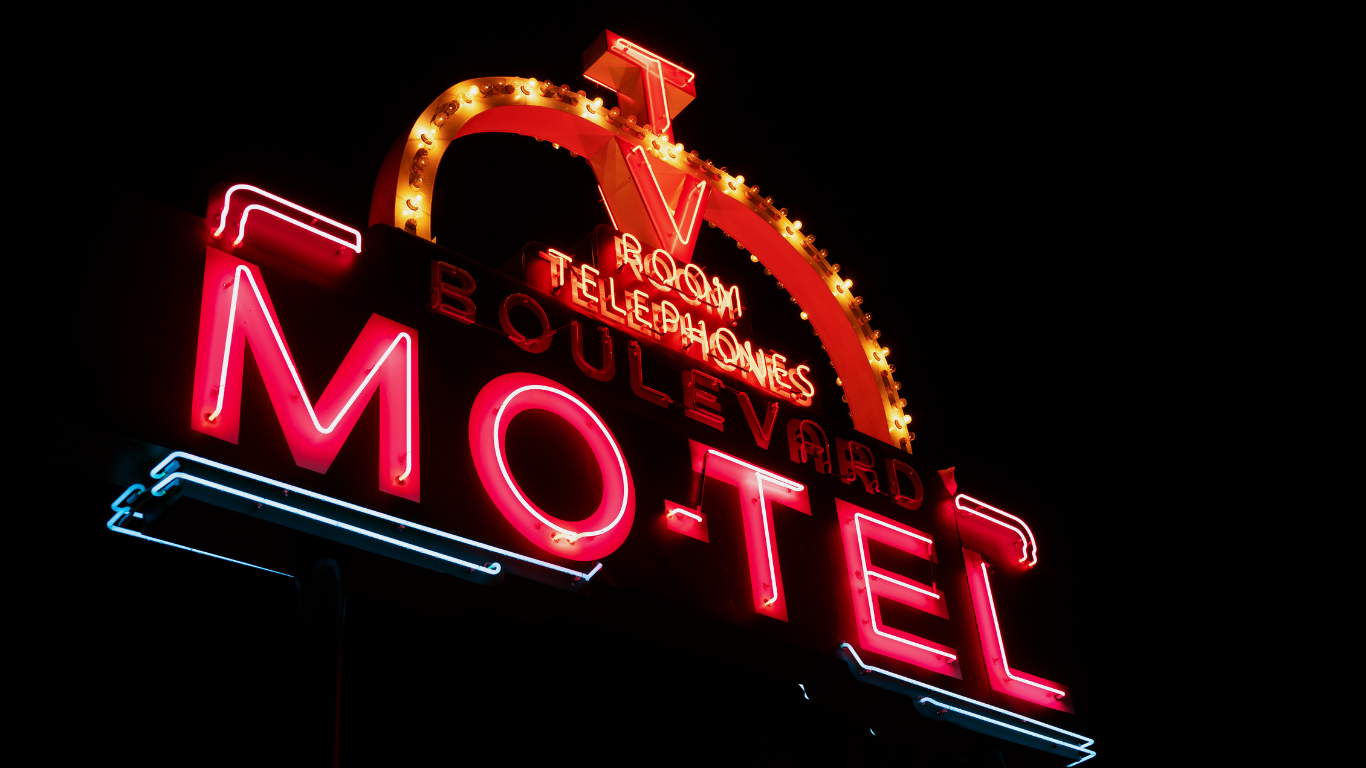When planning a trip, choosing the right type of accommodation is crucial for ensuring a comfortable and enjoyable stay. Hotels and motels, though often used interchangeably, have significant differences in terms of amenities, price, location, and overall experience. In this blog, we’ll explore the key distinctions between a hotel and a motel, so you can make an informed decision for your next journey.
1. Origins and Definition
Before diving into the features, it helps to understand the origins of both terms.
- Hotels: Hotels have a long history, dating back to the Roman Empire, where inns were used to lodge travelers. Modern hotels have evolved from this tradition to become establishments that offer a wide range of amenities, including restaurants, gyms, and conference centers. Hotels are designed to cater to a variety of guests, from leisure travelers to business professionals, and they are commonly found in urban areas or near major tourist attractions.
- Motels: The term “motel” was coined in the 1920s, originating as a blend of “motor” and “hotel.” Motels were designed specifically for motorists, offering easy access to rooms and parking directly outside. The idea was to provide convenient, budget-friendly lodging for road travelers needing a quick stop during long journeys, typically located along highways.
2. Location
One of the most visible differences between a hotel and a motel is their location:
- Hotels: Typically found in city centers, near airports, or tourist destinations, hotels are strategically located to cater to visitors who want easy access to attractions, business hubs, and transport facilities. High-end hotels often boast prime real estate in bustling downtown areas or picturesque vacation spots.
- Motels: Motels are predominantly located along highways or at the outskirts of cities, catering to travelers on road trips. The focus is on providing convenient overnight lodging for those traveling by car, with easy access to major roads.
3. Structure and Accessibility
The architectural design and accessibility of hotels and motels are another distinguishing factor.
- Hotels: Most hotels are multi-story buildings with rooms accessible from an internal hallway, and guests typically enter through a centralized lobby. High-rise hotels are common in city areas and are often equipped with elevators, conference rooms, and communal spaces. Security is usually tighter, with controlled access to various parts of the building.
- Motels: In contrast, motels are generally one or two-story buildings with rooms that open directly to the parking lot. This design prioritizes convenience for car travelers, as they can park right outside their room. Motels rarely feature central lobbies, elevators, or large common spaces, making them simpler and more utilitarian than hotels.
4. Amenities and Services
Perhaps the most significant distinction between hotels and motels lies in the amenities offered.
- Hotels: Known for offering a wide array of amenities, hotels can range from basic accommodations to luxurious, five-star experiences. Higher-end hotels often have pools, fitness centers, restaurants, concierge services, and spas. Room service, housekeeping, valet parking, and in-room dining are also standard in most hotels. Business centers and conference facilities make hotels a go-to for business travelers. Star ratings are commonly used to indicate the level of service and luxury guests can expect.
- Motels: Motels, by design, are more minimalist. They offer fewer amenities, usually limited to basics such as a bed, bathroom, and TV. Some motels may provide a simple continental breakfast or an outdoor pool, but they generally do not include room service, gyms, or restaurants. Because motels cater to short-term, transient stays, guests usually don’t expect the extensive services found in hotels.
5. Price
Budget is often a deciding factor when choosing between a hotel and a motel.
- Hotels: Prices for hotels can vary significantly depending on location, star rating, and services provided. A luxury five-star hotel in a major city can be considerably more expensive than a basic two-star hotel in a smaller town. Higher prices typically reflect additional amenities such as dining options, fitness facilities, and higher-end furnishings.
- Motels: Motels tend to be more affordable due to their no-frills approach. Because they focus on providing basic accommodation for short stays, motels are ideal for travelers on a budget or those looking for a quick overnight stop. The average cost of a motel stay is usually much lower than that of a hotel, making them popular among road trippers or budget-conscious travelers.
6. Length of Stay
Another factor that differentiates hotels from motels is the typical duration of stay:
- Hotels: Hotels are designed for a variety of stay lengths. Whether you’re staying for a single night, a weekend, or an extended vacation, hotels offer the amenities and services to accommodate guests for longer durations. They are often equipped to serve as a base for extended stays, with conveniences such as laundry services and business centers.
- Motels: Motels are more geared towards short stays, typically one or two nights. They’re meant for travelers passing through on a road trip or needing a place to rest for the night. Because of their limited amenities, motels are not generally suited for long-term stays.
7. Target Audience
Hotels and motels cater to different types of travelers:
- Hotels: Hotels attract a wide range of guests, including vacationers, business travelers, and those attending conferences or events. Upscale hotels cater to luxury seekers, while budget hotels appeal to cost-conscious tourists. Because of their varied amenities and locations, hotels are ideal for travelers looking for more than just a place to sleep; they want a full-service experience.
- Motels: Motels primarily attract road travelers and those in need of quick, affordable accommodation. Their clientele often consists of families on road trips, solo travelers, and budget-conscious individuals looking for a simple, no-fuss place to rest before continuing their journey.
8. Safety and Security
Safety is another important consideration when choosing between a hotel and a motel.
- Hotels: Hotels, particularly those in higher-end categories, often have more robust security measures, such as controlled access to rooms through a lobby, security staff, and surveillance systems. Internal corridors and room access can also offer additional layers of safety.
- Motels: Due to their open design, where rooms open directly to the outside, motels can sometimes pose security concerns. However, many motels implement basic safety measures, such as surveillance cameras or second-story rooms to reduce risks. Still, the level of security at a motel is generally lower than that of a hotel.
9. Additional Accommodation Types: Inns and Hostels
While hotels and motels are the most common lodging types, it’s worth mentioning inns and hostels, which offer alternative experiences.
- Inns: Traditionally, inns are smaller, family-run establishments found in rural or historic areas. Inns offer a cozier, more personalized experience compared to hotels or motels and often include home-cooked meals or communal dining. They typically have fewer rooms and higher price points compared to motels but can be similar in price to mid-range hotels.
- Hostels: A budget-friendly alternative, hostels cater to backpackers and young travelers. They usually offer dormitory-style accommodation with shared bathrooms, though some hostels may provide private rooms. Hostels are common in Europe and popular with travelers looking to save money.
Conclusion
Choosing between a hotel and a motel depends largely on your needs, budget, and the type of trip you’re taking. If you’re looking for luxury, services, and a central location, a hotel is the way to go. However, if you’re on a road trip or need a simple place to rest, a motel offers a practical, budget-friendly solution. By understanding the key differences in terms of amenities, location, and pricing, you can select the right accommodation for your next journey.
FAQs:
What is the main difference between a hotel and a motel?
The main difference is that hotels offer more amenities and services, while motels are typically designed for short-term stays and focus on convenience for travelers.
Which is cheaper: a hotel or a motel?
Generally, motels tend to be cheaper than hotels due to fewer amenities and services.
Do motels have room service?
Most motels do not offer room service, unlike hotels, which typically provide this service as part of their amenities.
Are motels as comfortable as hotels?
Comfort levels vary, but hotels typically offer more luxurious accommodations, while motels focus on basic, affordable lodging.
Why are motels more common along highways?
Motels are designed for travelers on road trips, which is why they are often located along highways for convenience.
Can motels offer long-term stays?
While motels are generally for short-term stays, some do offer long-term lodging options depending on the location and demand.
Do hotels provide free parking like motels?
Not all hotels provide free parking, especially in urban areas, whereas most motels offer complimentary parking for guests.




